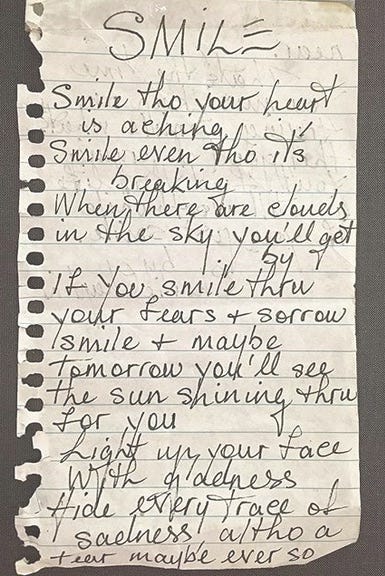Why Don't You Smile Now
On Certain Smiles, @#%&*! Smilers & Illegal Smiles
I’m a smiler. I can’t help it. My husband says I’m always on ‘smile patrol’. When I pass by a stranger on the street, if I make eye contact, I have to smile at them. Sometimes I annoy even myself with this reflex.
Sometimes I invite more connection that I want.
Sometimes people look at me like I’m deranged or dangerous. But more often, I get a lovely smile in response, sometimes accompanied by a slight hint of shock.
I remember being warned not to smile at people on the street in Paris, and found myself constantly wrestling with the desire, my face often contorting in an odd grimace from the effort not to smile. Eventually I gave up and just wandered around grinning at everyone and everything to a mostly cool response.
I love grumpy people. Like Lou Reed. Side note: I also love this sneery song about smiling written by Lou Reed and John Cale before they started the Velvet Underground.
At my kid’s school in LA, the Lollipop Man (you know, the person that holds up the lollipop sign to stop traffic so kids can cross safely) had a face deep etched in permanent grumpiness. It was almost impossible to imagine him smiling. The kids were mainly rude, never thanking him or even acknowledging his presence. That made me really mad, little brats. I always made a point of smiling at him and calling out ‘thank you’ which he would receive with a snarl and a nod. We secretly nicknamed him Mr Grumpy and my kid and I would both just beam our smile headlights on him relentlessly until one fine day he returned a small smile that nearly broke my heart with its genuine beauty. We were smile buddies after that and it made every day. Just thinking about him makes me smile now.
In Slavic cultures, to smile ‘politely’, or for no reason, is considered ‘a servant’s smile’ - hiding one’s true feelings - or worse, an ‘idiot’s smile’ (Russian proverb: ‘smiling with no reason is a sign of stupidity’). Fake smiles from strangers are not appreciated, and can be considered untrustworthy. Another expression is ‘Smile without a reason is a sign of treason’. Emotions are more likely to be kept private, to be shared with inner circles. Smiles are reserved for genuine interactions, at which point they are given freely. Salespeople won’t automatically smile at customers - its considered invasive. The polite way to greet someone is to let them go about their business and not get in their face by demanding a reciprocal smile. Smiling and laughing are considered to be somewhat interchangeable, and a rampant smiler might be sternly asked ‘What’s so funny?’.
I have a friend who couldn’t help smiling and laughing at uncomfortable situations. When we went selling fake Girl Guides cookies door to door as twelve year old girls in Adelaide (I think it just sounded fun and so far out of reach of our bohemian upbringings we were keen to experience its weird American wholesomeness), a small dog took offence and bit my hand, refusing to let go even as I swung my hand around, while I howled in pain. She was doubled over laughing with tears streaming from her eyes, apologising all the while.
When he was little, my son used to smile if he had done something he knew was naughty and was in trouble. It was infuriating but also made it impossible to get mad cos I couldn’t help smiling back at him.
Finland ranks first in the World Happiness Index, but Nordic countries have a similar attitude to smilers as Slavic countries. Happiness and smiling don’t always go hand in hand. In fact, a study uncovered 19 different kinds of smiles, many of them to mask our true emotions. Chimpanzees smile when they are afraid, to indicate they are non threatening. Many of us smile in response to discomfort, embarrassment, terror, or pain. Then there’s what is called ‘the miserable smile’, where the smiler is obviously unhappy but stoically putting a happy face on it, perhaps a genuine attempt to outrun the sadness or maybe a passive aggressive way of indicating their inner turmoil. In East Asian culture, anger is not often shown and people tend to smile when they are angry to mask it.
Faking a smile does actually work to stimulate the amygala, the brain’s centre for processing emotions, to release neurotransmitters encouraging a more positive state, as proved by a 2020 scientific study. I learnt this years ago in a yoga class, in a particularly challenging pose, when the instructor told me to ‘smile through the pain’. When I was giving birth and loudly screaming during an intense contraction, my midwife calmly reminded me that it would only make the pain worse and to try smiling instead. I forced a rearranged death rictus onto my face and much to my surprise it worked. A 2013 study apparently found that faking a smile to yourself in the mirror when trying on clothes in a store made you more likely to buy what you were trying on. Weird.
The smile does not actually come from the mouth, but from the lifting of the cheeks. This is what makes our eyes seem to ‘twinkle’ and why we were still able to discern smiles when we were all wearing masks. Lifting the cheeks while singing helps move the tongue towards the back of the soft palette, which can create a warmer, brighter vocal tone and help with reaching high notes, especially when singing ‘oohs’. Think of how opera singers often seem to smiling while they hit those glass shattering notes.
There are so many great songs about smiling. My favourite is probably John Prine’s ‘Illegal Smile’, which is revealed in a liner notes essay was “not about smokin’ dope. It was more about how, ever since I was a child, I had this view of the world where I can find myself smiling at stuff nobody else was smiling at. But it was such a good anthem for dope smokers that I didn’t want to stop every time I played it and make a disclaimer.”
The song made such an impression on young Kacey Musgraves she wrote a kind of answer song called ‘Burn One With John Prine’, stating that was her idea of heaven.
Wendy Saddington used to walk around singing the classic ‘Smile’ at the top of her lungs, with a beatific smile on her face (probably high). She wrote out the lyrics for me and told me to sing the song often.
Then there’s the brilliantly titled album by Aimee Mann ‘@#%&*! Smilers’ inspired by an internet thread about those annoying people that tell other people to smile. She told Paste Magazine ‘As a woman in the music industry it's also something I can particularly relate to. The request to smile more or be more peppy in promotional efforts for an album. I periodically still encounter it and I started thinking about this title when I was being asked why I wasn't writing any happier songs. But it's not like I'm depressed writing them (laughs) and I don't think they sound particularly sad. I like gravity and I think you can't have levity without gravity. That's like fiddling while Rome is burning.’
I’ve just recorded a song with lyrics about how just a smile from a stranger can cause a shift in the wind. Hopefully I’ll be sharing it with you real soon. In the meantime, here’s a playlist of a couple of hours of songs about smiling faces for you…
Fake it til you make it, or find yourself an illegal smile x








Ah I can see you smiling in the street, I can! Beautiful post thank you.
Lo. I loved this post and the music. Looking forward to hearing your new song. So why did the post resonate with me?
First it was a cultural education. First I used to know lots of Slavs who smiled, but they knew me. But when I have seen them on TV, they never look happy and my first response was, maybe it was because life was tough. But then I look at people in Africa, in a shelter where my daughter used to volunteer. The kids were orphans, most had been physically and sexually abused. Their diet was often a gruel with rice that had the same colour as the red dirt that surrounded their homes. They always smiled.
I thought about cultures and even animals. If you smile and show your teeth to a dog that doesn't know you, it will make them afraid.
In NZ like Aussie, we smile and say gidday to total strangers walking on the footpath, and mostly share a nod and a smile, even when I was a teenager walking home at midnight, walking home from work in a burger bar next to a fairly rough pub. That almost got me in trouble on my first trip to NYC, smiling and nodding to an African American man standing on a street corner in Manhattan. He looked back at me, snarling "What's your problem?"
As a cold calling B2B salesman I was also taught to smile on a bad day, and even though it felt totally fake, I could feel a little endorphins and maybe a relaxing shiver down my spine.
Thanks for an awesome post, which I will be sharing with my followers.